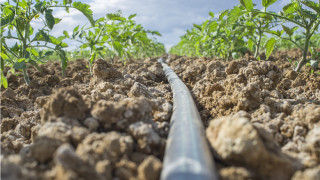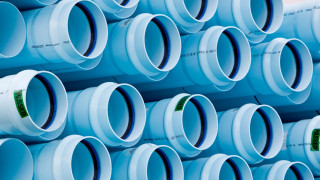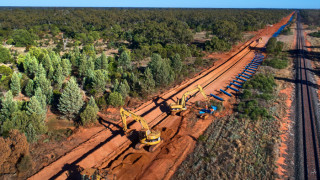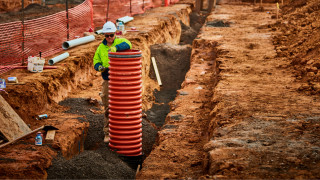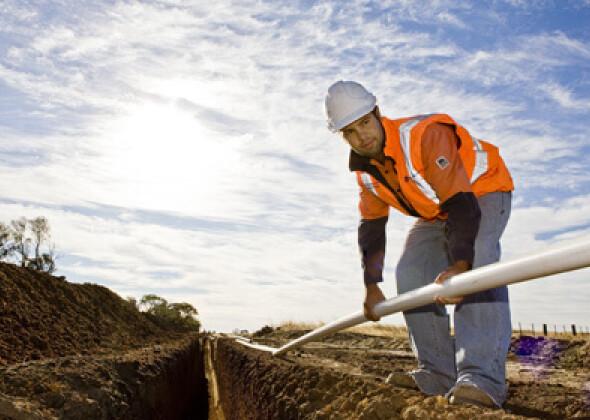PVC-M
Iplex Rhino® PVC-M Thermoplastic Pressure Pipes deliver a high performance thermoplastic piping solution, incorporating the advancements of modified PVC pipe technology. Providing superior characteristics over conventional un-plasticised PVC (PVC-U) pressure pipes, including higher impact resistance and ductility, reduced weight and greater hydraulic capacity.
Applications
Applications
Iplex Rhino® PVC-M Thermoplastic Pressure Pipes are suitable for installation in the following applications:
- Potable water supply trunk and reticulation mains
- Industrial process pipelines
- Effluent pipes for pumped sewage, industrial and rural wastes
- Pressure sewer systems
- Slurry pipelines carrying abrasive and corrosive mine or quarry materials
- Irrigation and turf watering systems
PVC Pressure Pipe and Fiittings Technical Guide
Advantages
The tough, ductile nature of Iplex Rhino® PVC-M Thermoplastic Pressure Pipe allows the use of a higher design stress, enabling pipes to be manufactured with reduced wall thicknesses and larger internal diameters enabling a more efficient use of resources.
The Iplex Rhino® PVC- M Thermoplastic Pressure Pipes are also designed to handle greater flow capacity and lower pumping costs compared to PVC-U pipes with the same nominal diameters. This translates to cost savings in the long run, as well as increased efficiency. Moreover, they are compatible with existing AS/NZS 1477-Series 1 and 2 pipe systems, and can even be interchanged with PVC-U pipes, providing smooth installation and wide compatibility features.
The high-quality rubber ring material used in Iplex Rhino® PVC- M Thermoplastic Pressure Pipes also facilitates easy and secure joint assembly, particularly in curved installations, making them a versatile option for a range of applications.
| Features | Benefits |
| Toughness and ductility | Resistance to poor handling and installation damage |
| Excellent corrosion resistance both internally and externally | Long service life, in excess of 100 years |
| PVC-M pipe dimensions are compatible with existing Series 1 and Series 2 pipe systems | Interchangeable with PVC-U pipes and Series 2 pipes produced from PVC-O, ductile iron, GRP and AC |
| Flexibility | Rhino® PVC-M pipes can be curved to alignment on site |
| High quality rubber ring joint with a permanently installed Reiber rubber ring | Provides a secure joint, which is easy to assemble and join |
| Light Weight | Approximately 30% lighter than PVC-U improving on environmental performance, site handling and laying efficiencies |
Material Options
Material Options
Mechanical Properties
| Property | Value & Unit |
| Specific Gravity | 1.42 |
| Vicat softening temperature | >=79°C |
| Effect on drinking water - AS/NZS 4020 | Complies |
| Short term minimum hoop stress at 1 hour and 20°C | 38.0 MPa |
| Minimum required strength ‘MRS’ at 20°C extrapolated to 50 years representing the 97.5% lower predicted limit | 24.5 Mpa |
| Minimum notched hoop strength at 20°C extrapolated to 50 years | 24.5 MPa |
| Hydrostatic design stress - AS/NZS 4765 | 17.5 MPa |
| Flexural modulus -Calculated from the ring stiffness determined in accordance with ISO 9969 |
3000 MPa |
| Poisson’s ratio | 0.38 - 0.40 |
Thermal Properties
| Property | Value & Unit |
| Coefficient of linear thermal expansion | 7 x 10-6/°C |
| Thermal conductivity | 0.138 - 0.150 W/m.K |
| Specific heat | 1045 J/kg.K |
| Vicat Softening Temperature | >79°C |
| Maximum practicable working temperature | 50°C |
Fire Resistance Properties
| Property | Value & Unit |
| Flammability | Will not support combustion |
| Ignitability - AS 1530* | 7 |
| Smoke development - AS 1530* | 9 |
| Spread of flame - AS 1530* | 0 |
| Heat evolved - AS 1530* | 2 |
*AWTA test report number 7-558803-CV
Electrical Properties
| Property | Value & Unit |
| Volume resistivity | 1016 ohm.cm (60% RH) |
| Surface resistivity | 1013 - 1014 ohm |
| Power factor | 0.015 - 0.020 at 20°C |
| Dielectric constant | 3.4 - 3.6 at 25°C (60 Hz) |
Product Details
Product Details
Standards and Approvals
Iplex Rhino® PVC-M pipe is manufactured to the Australian Product Standard under third party accredited Quality Management System (QMS) conforming to ISO 9001.
Rhino® PVC-M pipe has ISO Type 5 third-party StandardsMark™ Certification, License numbers SMK02748, SMK02468, SMK02749 and SMK02730 in accordance with AS/NZS 4765 “Modified PVC (PVC-M) pipes for pressure applications”.
Rhino® PVC-M pipe was appraised by Water Services Association of Australia (WSAA) – and rated “A” with a life expectancy in excess of 100 years.
Rubber Ring Seals
Iplex Reiber rubber rings conform to the requirements of AS 1646 “Elastomeric seals for waterworks purposes”. They are manufactured from SBR or EPDM elastomers.
Colour and Markings
Iplex Rhino® PVC-M pipes are colour coded as per AS/NZS 4765 and WSAA product specification WSA PS 209, to easily distinguish between the different types of pipe applications.
Rhino® pipe colour identification
| Product | Application |
| Rhino® PVC-M White (Series 1) | Drinking water |
| Rhino® PVC-M Blue (Series 2) | Drinking water |
| Rhino® PVC-M Purple (Series 1 & 2) | Recycled water |
| Rhino® PVC-M Cream (Series 1 & 2) | Pressure sewerage |
Iplex Rhino® PVC-M pressure pipes are marked in accordance with AS/NZS 4765 “Modified PVC (PVC-M) pipes for pressure applications”. Markings include:
- Manufacturers name and brand name
- Nominal Pipe Size
- PVCM
- PN
- Date of manufacture
- Manufacturers code
- AS/NZS 7465
- BEP PVC
Environmental Credentials
Iplex PVC-M pressure pipe is certified to confirm to the Best Environmental Practice PVC (BEP PVC) provisions of AS/NZS 1260.
The Green Building Council of Australia (GCBA) has defined the standards for best practice environmental performance for PVC manufacturing, against which Iplex’s processes have been audited by an independent certifying body. These permits users of Iplex PVC-M pressures pipes to claim positive PVC Credit Points under the GBCA’s Green Star Rating Scheme. Learn More
Iplex Pipelines has published verified Environmental Product Declaration (EPD) on our range of PVC-M Pressure Pipes. EPD’s are third party certified documents based on ISO 14025 and EN 15804 Standards that communicate transparent and comparable information about the life-cycle environmental impact of a product or service. Specifically, product declarations include information on the environmental impact of raw material acquisition, energy use and efficiency, composition of materials and chemical substances, emissions to air, soil and water and waste generation. View Iplex's PVC-M pressure pipe EPD
Rhino® PVC-M Pressure Pipe Range and Dimensions
Iplex Rhino® PVC-M pressure pipes are available in both Series 1 (White Rhino®) and Series 2 (Blue Rhino®). Purple Rhino® and Cream Rhino® can be supplied as Series 1 or Series 2 as required.
Rhino® PVC-M Fittings Range
Conventional socketed fittings conforming to AS/NZS 2280 – “Ductile Iron Pressure Pipes and Fittings” and WSAA TN2 are generally suited for use with Iplex Rhino® PVC-M Series 1 and 2 pressure pipes. A complete range of bends, tees, reducers, flange-spigot pieces and valves are available with rubber ring sockets ranging from DN100 to DN750.
Design
Information about PVC-M pipe flow capacity can be found in the PVC pressure pipe and fittings technical guide.
Handling & Storage
Handling & Storage
PVC-M pipes are normally delivered in timber packs designed to hold the pipes in position and protect them from point loading and ovalisation.
PVC pipes must be left in their packed units wherever possible until they are required to be installed.
For details about handling and storing Iplex PVC-M pipes, please refer to Iplex PVC pressure pipes and fittings technical guide.
Installation & Testing
Installation & Testing
The installation and testing of buried flexible pipelines is detailed in AS/NZS2032 Installation of PVC Pipe Systems and AS/NZS2566.2 Buried Flexible Pipelines - Installation. The installation of above-ground PVC pipelines is also detailed in AS/NZS2032 Installation of PVC Pipe Systems.
Refer to Iplex PVC pressure pipe and fittings technical guide for details about PVC-M pipe installation and testing.
FAQ
Frequently Asked Questions
Other PVC Pressure System products you may like…
Need help?
To speak with an Iplex sales & service team member
